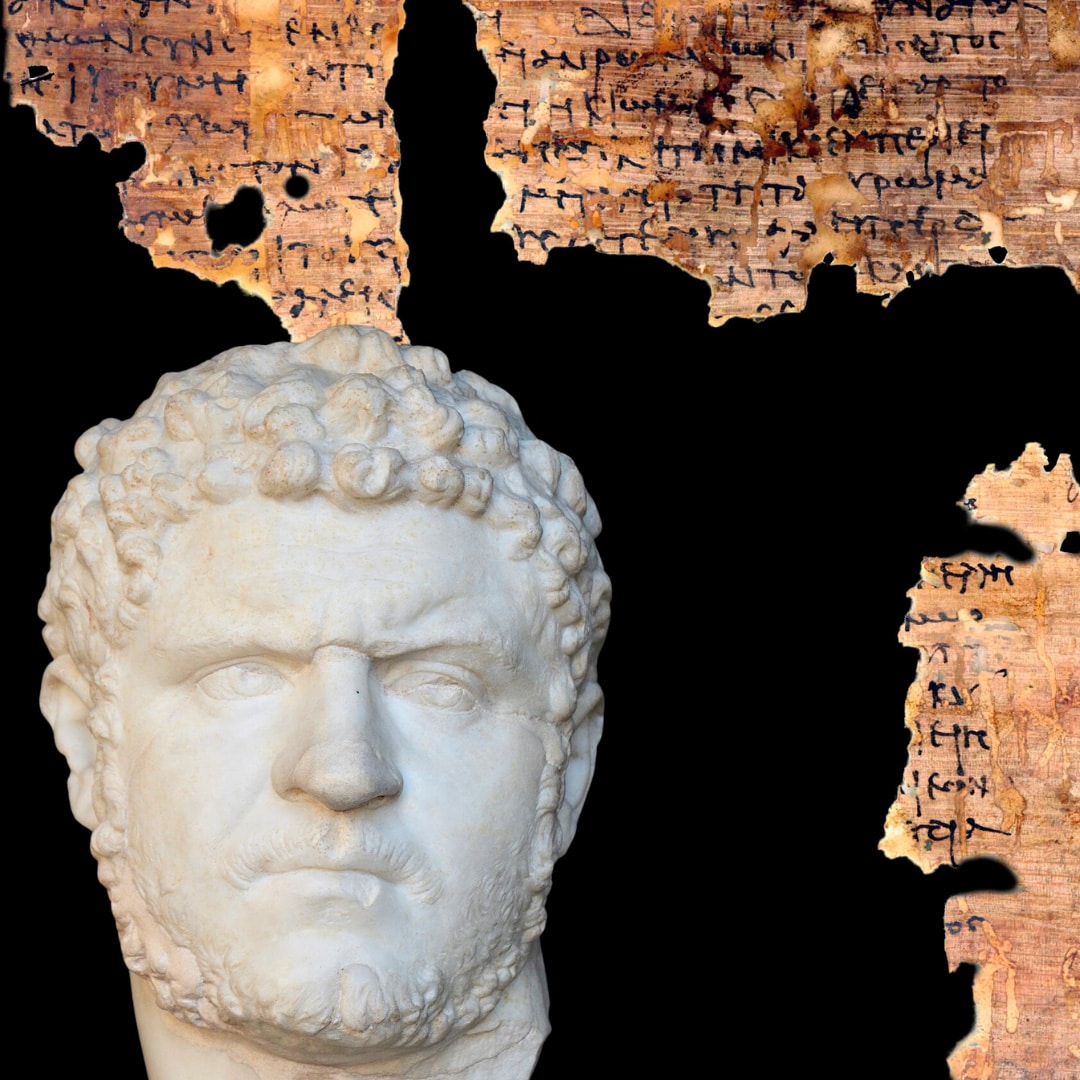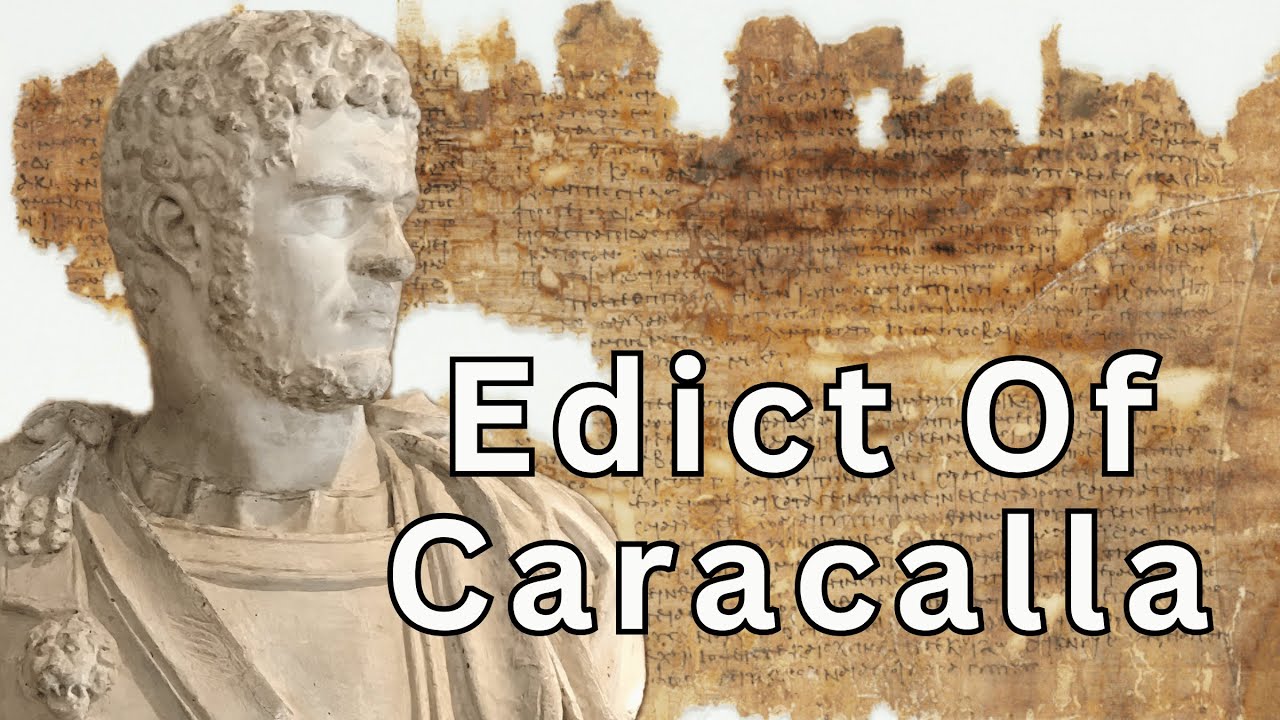Start with our video overview:
The Edict of Caracalla, also known as the Constitutio Antoniniana, granted Roman citizenship to nearly all free inhabitants of the empire. Issued by Emperor Caracalla in 212 CE, the decree marked a major shift in Roman society and governance, though its origins can be traced to the policies of his father, Emperor Septimius Severus.
Septimius Severus had come to power during the civil war of 193 CE, known as the Year of the Five Emperors. He strengthened imperial authority, increased soldiers’ pay, and expanded the role of the military in Roman politics. When he died in 211 CE during a military campaign in Britain, he left the empire to his sons, Caracalla and Geta. Their bitter rivalry soon turned violent, and Caracalla murdered Geta later that same year to seize sole control. His rule was marked by paranoia and brutality, though he continued his father’s military and administrative reforms. He raised soldiers’ pay again, burdening the treasury, and led costly campaigns against Germanic tribes and Parthia with limited success. Caracalla was assassinated in 217 CE while on campaign in the East.
The Constitutio Antoniniana declared that all free men in the empire were now Roman citizens, with the exception of the dediticii – a group of foreigners and freed slaves barred from citizenship due to their legal or penal status. A surviving fragment of the edict, the Papyrus Giessen 40, states that these new citizens would “bear all the burdens [of being a citizen], but share in the victory as well.” The “burdens” referred to Roman taxes and civic obligations.
Before the edict, Roman citizenship was limited and highly valued. After the Social War (91–88 BCE), most Italians became citizens, while some Roman colonies and select cities in the provinces shared the privilege. Others held Latin rights, a lesser status that could later be upgraded. Citizenship could also be earned through long military service or manumission from slavery.
Being a Roman citizen offered significant advantages. Citizens enjoyed legal protections that non-citizens did not, including the right to a fair trial and the ability to appeal directly to the emperor. They could own property, enter legal contracts, and marry under Roman law. Citizenship also carried social prestige and access to economic opportunities throughout the empire, making it a powerful symbol of inclusion and privilege within Roman society.
Several factors likely motivated Caracalla’s decision. Expanding citizenship increased the number of taxpayers, helping to offset the growing financial strain caused by higher military expenses. It also broadened the pool of potential recruits for the army and simplified legal administration by unifying provincial and Roman law under one system.
The exclusion of the dediticii, however, continued to cause tension within the empire. Their ambiguous status persisted into the following centuries, as Rome relied more heavily on foreign groups for military support. By the fourth century, these outsiders were reclassified as foederati – allied peoples who fought for Rome but remained outside full citizenship. The resentment created by this divide fueled the rise of powerful tribal leaders, such as Alaric the Goth, who attacked Rome and sacked it 410 CE.
Bibliography:
- Blois, Lukas. “The ‘Constitutio Antoniniana’ (AD 212): Taxes or Religion?” Mnemosyne 67, no. 6 (2014): 1014–21. http://www.jstor.org/stable/24522899
- “Constitutio Antoniniana.” UNESCO. https://www.unesco.org/en/memory-world/constitutio-antoniniana
- Cooper, Frederick. “Imperial Citizenship from the Roman Republic to the Edict of Caracalla.” In Citizenship, Inequality, and Difference: Historical Perspectives, 27–40. Princeton University Press, 2018. https://www.jstor.org/stable/j.ctvc776d2.5
- Imrie, Alex. The Antonine Constitution: An Edict for the Caracallan Empire. Leiden and Boston: Brill, 2018.
- Mathisen, Ralph. “Peregrini, Barbari, and Cives Romani: Concepts of Citizenship and the Legal Identity of Barbarians in the Later Roman Empire.” The American Historical Review 111, no. 4 (2006): 1011–40. https://www.jstor.org/stable/10.1086/ahr.111.4.1011
- “The Constitutio Antoniniana.” https://www.ostia-antica.org/caracalla/laws/constitutio.htm
This content is brought to you by The American Institute for Roman Culture, a 501(C)3 US Non-Profit Organization.
Please support our mission to aid learning and understanding of ancient Rome through free-to-access content by donating today.
Cite This Page
Cite this page as: Darius Arya, The American Institute for Roman Culture, “Edict of Caracalla (Constitutio Antoniniana),” Ancient Rome Live. Last modified 10/26/2025. https://ancientromelive.org/edict-of-caracalla
License
Created by The American Institute of Roman Culture, published on 10/26/2025 under the following license: Creative Commons: Attribution-NonCommercial-ShareAlike. This license lets others remix, tweak, and build upon this content non-commercially, as long as they credit the author and license their new creations under the identical terms. Please note that content linked from this page may have different licensing terms.




